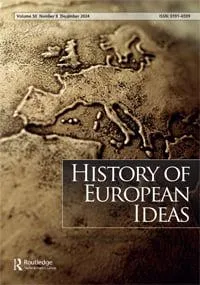This special issue posits that much more can be said about how transnationalism became an integral part of the lived experience of many men and women within the revolutionary period. It does so by focusing on translation as a particularly rich source of revolutionary communication that crossed all sorts of national, political and social divides.
Dr Rosa Mucignat, Reader in Comparative Literature
05 February 2025
Academics spotlight role of translation in spreading revolutionary ideas
A special journal issue co-edited by academics in the Department of Languages, Literatures and Cultures interrogates how translators and their translations shape our study of history, with focus on the global impact of the French Revolution.

The issue of the History of European Ideas was edited by Professor Sanja Perovic, Professor of French Literature and Cultural History at King’s, Dr Rosa Mucignat, Reader in Comparative Literature at King’s, and Professor Erica Joy Mannucci from the University of Milan-Bicocca.
The edition focuses on how revolutionary ideas of liberty, equality and rights not only travelled in translation – but also pinpoints that these ideas were themselves forged by transnational entanglements, in which translators played a vital part.
Translation has played a vital yet mostly overlooked role in the transfer of revolutionary culture across the globe. This special issue marks a first step in identifying the methods and sources that might contribute to writing this history.
Professor Sanja Perovic, Professor of French Literature and Cultural History

In the journal’s introduction, ‘Entangled histories of revolution in Europe: translation and transnationalism’, Professor Perovic, Dr Mucignat and Professor Mannucci showcase how the movement of texts and people across languages and cultures made possible the experience of the French Revolution as a global event.
The paper explores how the French revolutionaries imagined themselves as acting on a world stage in which they were fighting not just for their own freedom but the liberation of all peoples from the yoke of tyranny and despotism. Ideas from the French Revolution travelled through translators and translations, and became the starting points for the political ideologies that shape politics today – such as liberalism, conservatism, communism, socialism and decolonial movements.
Translation offers us a privileged insight into how the revolution emerged as a pluralistic movement, in which different agents intersected and worked together and separately to create, extend, revise or rewrite a narrative of revolution that was still in the process of development.
Dr Rosa Mucignat, Reader in Comparative Literature
Articles in the issue substantiate a key premise of the Arts & Humanities Research Council (AHRC) project Radical Translations: The Transfer of Revolutionary Culture between Britain, France and Italy (1789-1815) – that translations and their publishing contexts, alongside the biographical trajectories of the translators themselves, serve as important primary sources for mapping and researching how transnationalism was experienced as a historical practice.



